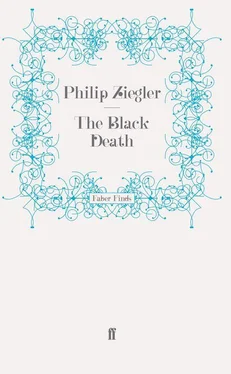With the parson’s death and the steward away the steward’s clerk was the only villager left who knew how to read and write. Usually he went with the steward on his travels but this time he had luckily stayed behind. In the name of the reeve he now wrote to the Bishop explaining the disasters which had overtaken the village and pleading that a new priest might be sent them as soon as possible. The letter was taken to the highway by one of the villeins and entrusted to the first respectable-looking traveller who came along. Now the village could only wait and hope.
The next two months were an almost uninterrupted nightmare. Sometimes two or three days at a time would pass without any new victims and the hopes of the villagers would begin to rise, but always in the end the disease struck again. One by one they sickened and died: the survivors kept the tally of the dead and wondered secretly who would be the next to go. It seemed that the hunger of the plague would only be satisfied when the last inhabitant had followed his parson to the grave. The old reeve was one of the first to die, leaving the village with no sort of leadership. All the men who had the courage and the strength rallied to the hall of the manor and elected Roger their new reeve. The court was not properly constituted in the absence of the steward but, in the circumstances, no one was disposed to worry about formalities. Apart from this one burst of corporate activity, the village lapsed into total apathy. Nobody tended the fields – for who would be left alive to reap the harvest? The cattle were neglected; the flimsy houses began to fall into disrepair; men and women lost all interest in their own appearance and lurked fearfully in their houses as if afraid to face the open air.
Almost the only occupation which aroused any interest was burying the dead. In the parson’s absence, the steward’s clerk used to read the service. After ten days or so of this, however, an itinerant friar turned up on the way to his religious house at Romsey. He promised the villagers that he would stay at Blakwater until a new priest arrived or the plague was over and he was as good as his word; tending the sick and laying out the dead with a fearlessness which quickly won him the respect and affection of the people. Then a new problem arose. In the first three weeks more than twenty people died and the old churchyard, crowded even before the epidemic, was quickly choked with new graves. Even if it had not been, Roger had a theory that it was dangerous to bury the plague victims so close to the centre of the village. He asked the friar to consecrate a new plot of land a few hundred yards away on the edge of the lord’s demesne. At first the friar refused; the plague could not frighten him but the anger of the Bishop if a new churchyard was opened without his permission and the payment of the usual fee was quite a different matter. However Roger promised that the fee would be paid and everything regularized in due course and, in the end, the friar grudgingly agreed.
The very next day a chaplain of the bishop’s rode into the village. The letter had been received and would be acted on, he told Roger, but there was no hope that the new priest would be in Blakwater for another three weeks at least. At the moment the Bishop had more than eighty benefices vacant in the diocese and, though he was doing all he could to fill them, some delay was inevitable. The chaplain looked coldly at the friar and still more coldly at the new graveyard but, since he could do nothing to remedy the matter, wisely held his peace. The ugly sullenness of the villagers probably warned him that it would be unwise to push them far.
When the chaplain rode on to Preston Stautney, Roger went with him so as to see how his neighbours were faring. Only then did he realize that, however badly Blakwater had suffered, others had fared still worse. The community had disintegrated. Of the sixteen or seventeen houses only four seemed still to be inhabited. The door of the church was standing open and somebody had been chopping up the stalls, presumably for firewood. Of the parson there was no trace at all, unless a large mound of freshly-dug earth in a corner of the churchyard covered both priest and flock. The only people they could find were a couple of old women sunning themselves forlornly outside their houses. All the others were dead, they said, dead or run away. The chaplain cross-examined them in an effort to get some rather more precise information and in the end established that at least a dozen villagers had taken to the woods in the hope of escaping the plague. But whether they were still alive or had been struck down in their flight, the old hags neither knew nor cared.
Soberly Roger returned to his home. He had seen so much suffering in the last few weeks, had felt so much pity and so much fear, that it seemed he had no emotion left which could be squeezed out for the sake of these further victims. Indeed, as he walked down the hillside to Blakwater he caught himself in a mood of self-congratulation at his own light escape. Uneasily he crossed himself and dismissed the dangerous thought from his mind. He had cause to remember his gesture and the moment of disquiet which had inspired it. When he arrived home he found his eldest son groaning with pain, vomiting almost continuously and in a high fever. The boy died after four days of intolerable suffering.
Even before he was in his grave Roger’s only daughter and his wife were on their sick beds. The former was one of the very few who were infected by the plague but still survived – her life was in great danger for several days but by some freak of chance the buboes proved less malignant than in other cases and subsided or suppurated harmlessly. Roger’s wife fought for her life for more than a week, clinging on tenaciously even when her body had been reduced to a shattered and malodorous hulk. In the end she succumbed and Roger cursed the god who could bring such misery on his defenceless servants.
Impotent, resentful, panic-stricken: the villagers were in a mood to revenge themselves on any target which came within their range. Poor Mad Meg provided an easy victim. Someone had met her by night conversing suspiciously with her obviously diabolic cat. Someone else had seen her lurking near the well – armed with poison without a doubt. A crowd of villagers worked themselves into a drunken frenzy on beer looted from the house of the ale-brewer and marched indignantly towards her house. Mad Meg heard them coming and slipped away into the woods. Probably she would have escaped their clumsy pursuit if one of the peasants had not seized hold of her cat and, brandishing it by the tail, smashed its head against a rock. In hysterical defence of the only living creature that had shown her any trace of love, Meg ran out from her hiding place among the trees. The villagers attacked her with sticks and stones and battered her to death in the clearing outside her miserable hovel.
Even the longest nightmare must end. By the time that the new parson arrived in early March the worst was over. The plague lingered for another two months but its full ferocity was past. A gap of four days occurred before the next case, then of five, then of a week; by the beginning of August there had been no new attack for nearly two months and the villagers could feel themselves safe. Thirty-eight of them had died, three others had been infected but had recovered, poor Mad Meg also had her claim to be a victim of the plague. Little by little the survivors began to look about them, to realize that they were still alive and likely to remain so, to pick up the pieces of their lives again.
They had plenty to do to keep themselves occupied. All the work in the fields had been neglected for more than six months and now, with a greatly weakened labour force, they had to make good the wasted time. But there were compensations. The same amount of land and cattle was now available to be shared out among fewer people; this meant that the work was harder but also that the reward was greater. Roger, who had considered himself one of the most over-worked villeins on the manor, was pressed by the steward to take on half his neighbour’s land at a nominal rent. Anything, the steward pleaded, was better than that it should go to waste. Reluctantly Roger agreed and found to his surprise that, with some hired help from one of the freemen of Blakwater, he could manage the extra land quite easily. Two or three other villeins also took on extra land and found themselves increasingly prosperous as a result.
Читать дальше












